At seafood restaurant La Perla in Calasetta on the island of Sant’Antioco in the south-west corner of Sardinia we had many great seafood appetizers, including an octopus and radicchio salad. The combination works very well, not just because of the color but also because of the nice contrast between the tender slightly sweet octopus and the crispy bitter radicchio. This is Italian cooking at its best: a small number of good quality ingredients, prepared correctly. The octopus was tender and not too cold, and the salad was dressed with good quality olive oil and balsamic vinegar. This is one of the many dishes from our vacation in Sardinia that I wanted to recreate at home.
I had always prepared octopus sous-vide and was curious about the traditional way. Octopus can be tough and/or bland, so it is important to prepare it right. In Italy it is a tradition to plunge the octopus in boiling water three times before continuing to simmer the octopus in the same water, and I had always wondered why. So when Bea was writing about octopus on her blog, I did not hesitate to ask her about this. Bea is an Italian blogging friend who has a wonderful blog Viaggiando con Bea about her passions: food and travel. She went to the trouble of finding out for me, as she had always been plunging the octopus three times because everybody does it that way, without knowing why. She asked a fisherman and he told her it is so that the tentacles curl up and the octopus will fit more easily into the pot. Bea also explained how she prepares octopus. Ti ringrazio di cuore, Bea!
There is a shop in Amsterdam (Landmarkt) that sells octopus legs (not whole octopus, just the legs) at a bargain price of about 8 euros per kilo. They have been frozen, but that is fine as that is often done even with fresh octopus to make it tender. Bea also mentioned that if she buys fresh octopus, she will put it in the freezer for at least two days to tenderize it. The bargain price is nice, because octopus shrinks a lot when you cook it, so you will need about 350 grams (.75 lb) per person. I decided to cook half the octopus sous-vide and the other half the traditional way, following Bea’s instructions, to compare sous-vide with traditional cooking. The recipe for the salad will follow underneath.
How to cook octopus the traditional way
Clean the octopus if needed. Bring a pot of water to a boil. Add just a bit of salt and some celery (plus other aromi if you like, such as a bay leaf or juniper berries). When the water boils, plunge the octopus in there…
…and lift it out, and plunge again, for a total of three times.
Return the octopus to the water.
Cover the pot, and allow to simmer for 30 minutes.
After 30 minutes, check with a toothpick or skewer (or fork) whether the octopus if tender. Give it another 10 minutes if needed.
Allow the octopus to cool off completely in the cooking water. (This will keep it more juicy.)
How to cook octopus sous-vide
Vacuum seal the octopus with celery and a little bit of salt (plus other aromi if you like, such as a bay leaf or juniper berries).
Cook sous-vide for 4 hours at 77C/170F.
The octopus will release quite a bit of liquid into the bag, which you can save for another purpose like making a soup or risotto. Allow the octopus to cool off by submerging the bag in (ice) cold water.
The verdict: octopus sous-vide or not sous-vide?
The traditionally cooked octopus is on the left, the sous-vide is on the right. The traditionally cooked seemed to have shrunk just a bit more.
On the photo you can’t really see the difference, so you’ll have to take my word for it.
First of all, both preparations of octopus were good. They were tender and tasty.
But… the sous-vide octopus was better than the traditionally cooked octopus because it was more juicy and more flavorful. The latter is not surprising, as the traditional way is kind of like making octopus stock, and some of the flavor will end up in the cooking water.
And now for the recipe for the salad.
Ingredients
For 2 large or 4 small servings
700 grams (1.5 lb) cleaned octopus
celery
250 grams (.55 lb) radicchio
salt and freshly ground black pepper
good quality extra virgin olive oil
good quality balsamic vinegar
Instructions
Prepare the octopus as explained above. Once cool, slice it up. If you refrigerated the octopus, make sure to allow it to come to room temperature before serving.
Cut the radicchio into wedges and remove the tough core as shown, then cut it into ribbons. Wash and dry them thoroughly.
Put the radicchio in a large bowl together with the sliced octopus.
Dress with extra virgin olive oil, salt, and freshly ground black pepper.
Drizzle some balsamic vinegar on top…
…and serve.
Flashback

Limburg is a province in the South of the Netherlands that is famous for its pies, known as vlaai. One of the most famous types is vlaai with gooseberries (kruisbessen in Dutch, krosjele or kroezjel in the local dialect), topped with meringue.
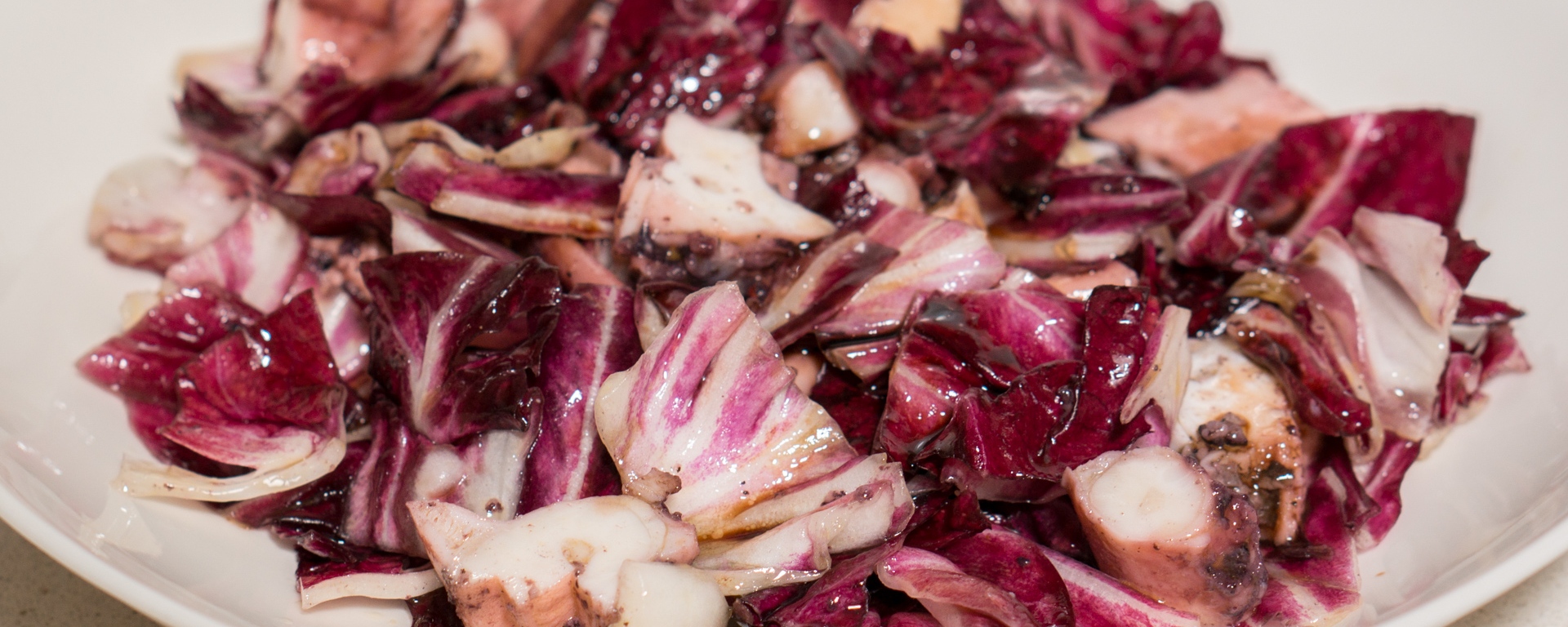


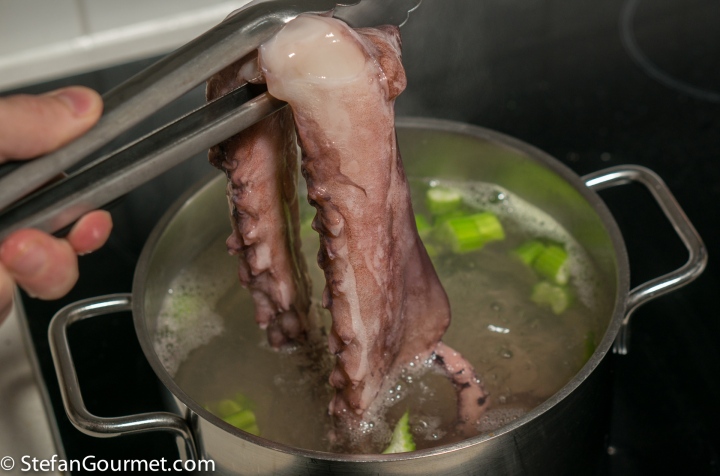
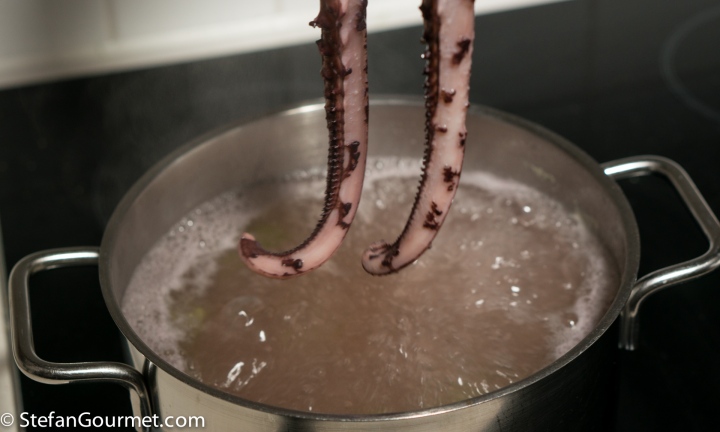







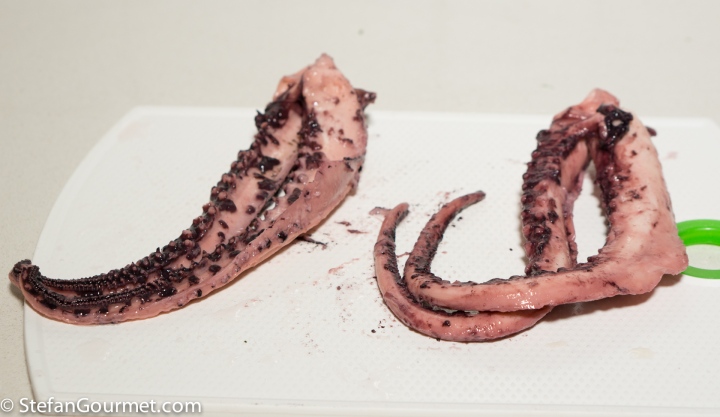

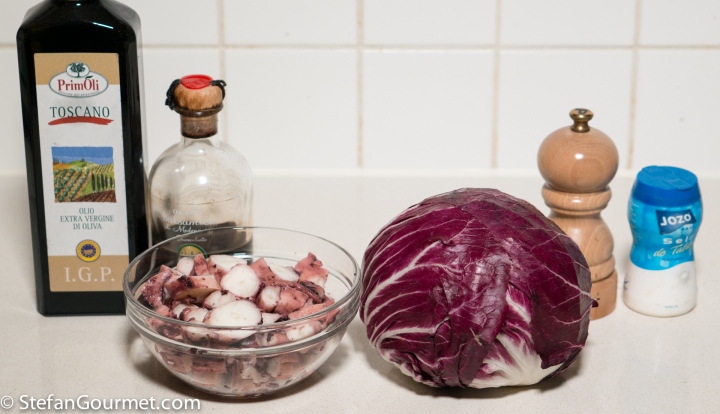
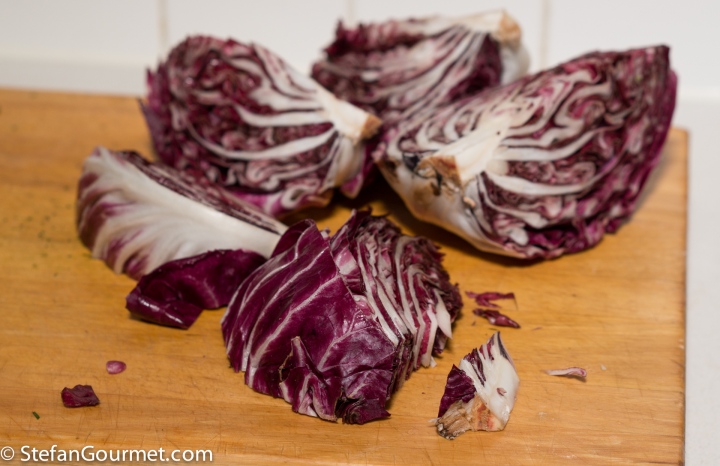




Even if it’s more difficult for me to read in English I found your post really well done. You explained everything really clear and you got very well my little lesson. I see that your way of cooking is much better than mine. I thank you very much for mentioning me in your blog. I like your version with radicchio salad. I’m sure it will be very good. Thank you Stephan it’s always a pleasure to follow you. Ciao 😉
LikeLiked by 1 person
Beautiful recipe! If you chop the core of cabbage into small cubes and roast it, it is actually quite tasty…! Cabbage is Abba’s favorite vegetable…
LikeLiked by 1 person
Thanks Shanna, although they look very much alike this is a type of endive (Cichorium is the Latin family name) rather than cabbage (Brassica). Roasting the core would probably still work, so thanks for the suggestion!
LikeLiked by 1 person
Octopus and radicchio are a great pair!
LikeLiked by 1 person
Love octopus but have never even thought of combining it with radicchio – what just a few prima quality ingredients can do! Knew about the freezing but not about the art of making the beastie ‘curl’ 🙂 ! I can get much better quality baby octopus here but methinks you need the bigger characters for this to counteract the salad: I have to cook mine somewhat longer usually . . . yes, the ‘ancient way’ 🙂 !! Will be tried very soon . . .
LikeLiked by 1 person
Non ho mai provato il polpo con il radicchio, è il momento!
LikeLiked by 1 person
The more I read your posts, Stefan, the more I am intrigued by the sous vide method of cooking. I’m instinctively skeptical of anything that’s “trendy”, but if something really gives better results, I shouldn’t let my prejudices get in the way …
LikeLike